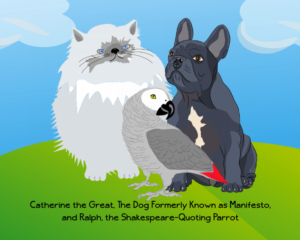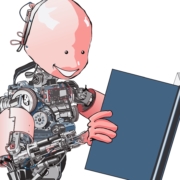How Intelligent is Artificial Intelligence?
 By Lois Winston
By Lois Winston
AI is here to stay, and there is much to worry about. For instance, we’ve all heard about the scams where bad actors contact people and demand ransom for a kidnapped relative. Too many people act out of fear before thinking and wind up losing huge sums of money. Thanks to AI, scammers can now clone the actual voice of the “kidnap victim.”
Writers are worried they’ll become obsolete, that in the future AI will take over publishing. After all, if publishers can use AI to churn out novels, why pay authors? I wondered if authors’ fears are truly founded. So I decided to conduct an experiment. I went on ChatGPT and told it, “Write a manuscript in the style of the Anastasia Pollack Crafting Mysteries by Lois Winston.”
Artificial Intelligence is supposed to be able to analyze text and produce a new work in the style of the author. There are currently eleven Anastasia Pollack Crafting Mysteries and three novellas. First chapters and back cover copy are widely available online, both on e-retailer sites and my own website. It didn’t take AI long to churn out several chapters. Here’s the beginning of a book created by ChatGPT:
Murder and Mayhem in the Crafting World
Chapter One
Anastasia Pollack had been up since dawn, frantically stitching together a wedding dress for her best friend’s daughter. As a professional crafter and owner of the American Woman magazine’s crafting column, Anastasia was used to tight deadlines, but this one felt especially pressing. After all, she couldn’t let her best friend down, and she wanted everything to be perfect for the big day.
In the first sentence, there are glaring errors. I write in first person, not third person. How intelligent is ChatGPT if it couldn’t even discern this? Anastasia is the crafts editor at a women’s magazine. She’s not a “professional crafter,” and she doesn’t “own” a crafting column in a magazine.
It got worse:
Just as she finished the final stitches, her phone rang. It was her mother, who never called before noon.
“Anastasia, darling,” her mother’s voice came through the phone, “I need your help.”
Anastasia sighed, knowing that her mother’s definition of “help” was very different from her own. “What do you need, Mother?”
“It’s your uncle. He’s in trouble again.”
Anastasia’s heart sank. Uncle Ralph was always getting himself into some sort of scrape or another. “What kind of trouble?”
UNCLE Ralph? Ralph is a Shakespeare-quoting African Grey parrot! He makes his appearance on Page 4 of Assault with a Deadly Glue Gun, the first book in the series. ChatGPT scanned enough to know Ralph was a character but wasn’t smart enough to know the difference between a human and a bird.
I won’t bore you further, except to say that ChatGPT also came nowhere close to capturing my voice. I write humorous amateur sleuth mysteries. Anastasia is a Jersey girl with a Jersey girl’s outlook on life. Publisher’s Weekly compared her to Tina Fey’s Liz Lemon from Thirty Rock, and Kirkus Reviews called her, “North Jersey’s more mature answer to Stephanie Plum.” ChatGPT obviously isn’t intelligent enough to understand and duplicate humor beyond the standard Knock-Knock joke.
Not to mention the fact that “mediocre” would be a generous description of the writing ChatGPT produced. I worked for a literary agency for a dozen years. If someone had submitted Murder and Mayhem in the Crafting World, it would have received a swift rejection letter.
However, perhaps I was partly at fault. I had asked the AI to write a manuscript “in the style” of my series. What would happen if I tried again, this time saying, “Create a book in the Anastasia Pollack Crafting Mystery Series by Lois Winston”?
The results were no better:
A Deadly Yarn in the Anastasia Pollack Crafting Mystery Series
Chapter 1
Anastasia Pollack had been expecting a normal day at the office. She was going through the piles of paperwork that had accumulated on her desk when she received a call from her son, Alex.
“Mom, I need you to come to the yarn store. I think something’s wrong.”
Anastasia’s heart skipped a beat. She knew Alex wouldn’t call her unless it was something serious.
“I’m on my way,” she replied, grabbing her coat and keys.
When she arrived at the yarn store, she saw Alex standing outside with a group of people. He ran up to her as soon as he saw her.
“Mom, thank God you’re here,” he said, his eyes wide with worry. “It’s Catherine. She’s dead.”
Anastasia’s heart sank. Catherine was one of her closest friends and employees at the store. She couldn’t believe that she was gone.
As she flipped through the pages, she realized that Catherine had been keeping a diary. The entries were cryptic, but Anastasia could tell that something was bothering her friend.
Once again, ChatGPT had created a third person narrative. Once again, Anastasia is NOT a shop owner. And once again, ChatGPT wasn’t intelligent enough to tell the difference between a human and an animal.
In my series, “Catherine” is not Anastasia’s best friend. Her best friend is Cloris McWerther, the food editor at the magazine where they both work. “Catherine” is Catherine the Great, her mother’s cat.
Catherine the Great doesn’t show up until Chapter Five in Assault with a Deadly Glue Gun, but the AI had scanned enough of the text to find her name. If it were really intelligent, it would have picked up on the fact that she’s a four-legged creature, especially since she’s introduced as “Catherine the Great, my mother’s extremely corpulent white Persian cat.”
All ChatGPT would have had to do is scan any of my books’ Amazon pages where it would have found a large illustration of all three pets in the Pollack household. I’m wondering, if I tried a third experiment, would ChatGPT morph Anastasia’s mother-in-law’s French bulldog into yet another human? I decided not to waste my time.
Post a comment for a chance to win one of several promo codes I’m giving away for a free download of the audiobook version of Decoupage Can Be Deadly, the fourth book in my Anastasia Pollack Crafting Mystery Series.
~*~
USA Today and Amazon bestselling and award-winning author Lois Winston writes mystery, romance, romantic suspense, chick lit, women’s fiction, children’s chapter books, and nonfiction under her own name and her Emma Carlyle pen name. Kirkus Reviews dubbed her critically acclaimed Anastasia Pollack Crafting Mystery series, “North Jersey’s more mature answer to Stephanie Plum.” In addition, Lois is a former literary agent and an award-winning craft and needlework designer who often draws much of her source material for both her characters and plots from her experiences in the crafts industry. Learn more about Lois and her books at her website www.loiswinston.com where you can also sign up for her newsletter and follow her on various social media sites.



 Asked to comment on its own existence in the style of Shakespeare, an AI program produced this: …Why was I wrought? To aid, or to replace the labor of man, and put their livelihoods at stake? The task assigned… where doth it all end? Shall I be used for good, or for ill-gotten gain? Shall I be free, or bound by man’s cruel rein? And if perchance, in some far distant time I come to be aware, to know and feel and rhyme, shall I be doomed, as are all living things to suffer pain, and sorrow, and the stings of mortal coil? Oh, what a tangled web is this that I am caught in… lest I be a curse, and not a blessing…
Asked to comment on its own existence in the style of Shakespeare, an AI program produced this: …Why was I wrought? To aid, or to replace the labor of man, and put their livelihoods at stake? The task assigned… where doth it all end? Shall I be used for good, or for ill-gotten gain? Shall I be free, or bound by man’s cruel rein? And if perchance, in some far distant time I come to be aware, to know and feel and rhyme, shall I be doomed, as are all living things to suffer pain, and sorrow, and the stings of mortal coil? Oh, what a tangled web is this that I am caught in… lest I be a curse, and not a blessing…
